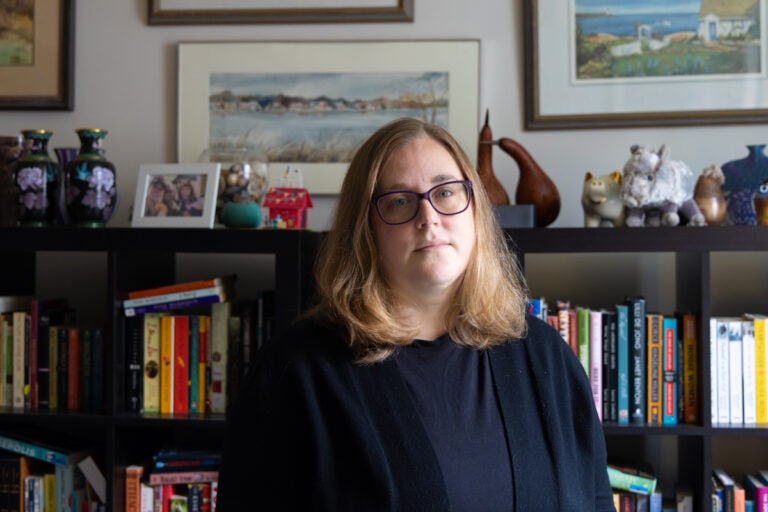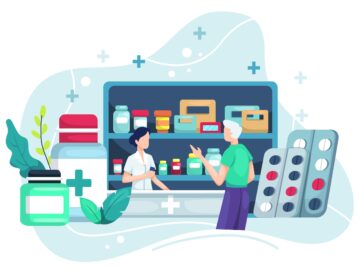Does it matter what time you take your medicine?
Years of research show it matters when a patient takes medicine. So why don't drugs come with those instructions?
Listen 9:48
Alaina Johns manages medication for multiple conditions. (Kimberly Paynter/WHYY)
This story is from The Pulse, a weekly health and science podcast.
Find it on Apple Podcasts, Spotify, or wherever you get your podcasts.
Every day, journalist Alaina Johns sets her schedule partly based on taking four doses of medication for bipolar disorder.
“The side effects include making me feel nauseated and dizzy and foggy. It makes my eyes blurry. So I have to really carefully time when I take it,” she said. “Otherwise, I can’t manage the side effects of the medication that stabilize my mood and keep me functioning.”
That means she must schedule her meetings, classes, or other work events to leave time for the drug’s side effects to pass. Every week, she fills out her calendar and sets reminders on her phone to take the medicine at specific times.
She’s been on this schedule for around a year, but she may have to change medications soon, which means developing a new routine all over again.
“It’s pretty common for folks in my situation to be stabilized for months or years, and then for whatever reason, the brain in their body does what it does, and the medications you were on don’t work as well anymore, and they need to be recalibrated or changed,” Johns said. “It’s the story of our lives.”
But the timing of medication could matter in ways that go beyond managing side effects, said Garret FitzGerald, a physician scientist at the University of Pennsylvania who specializes in chronobiology and pharmacology.
“In the last 30 or 40 years, we’ve known that the time of dosing can influence substantially the drug exposure, the drug levels that were attained in blood after giving a drug at different times of day. And yet that’s influenced practice almost not at all,” he said.
Subscribe to The Pulse
To understand why the research has not translated to advice for patients, he pointed to the one exception — statins, where the drugs come with instructions to take them in the evening.
Statins target a protein that controls how much cholesterol the body makes. Scientists know that this protein is most active in the evenings, that’s why there’s the instruction to take the statins at night.
In this case, scientists know clearly how the drug works, what it targets, and how the target changes depending on the time of day. But “there are plenty of other intriguing examples where we don’t really understand the full story yet,” FitzGerald said.
That’s because for most drugs, the full story is very complicated, said ophthalmologist Russell Van Gelder, who is an expert in circadian rhythms at the University of Washington.
“The holy grail that many treating physicians would like is that there is an ideal phase for every drug. And so, if you had infinite resources, you could test every drug at every time of day and say, well, it’s best to take your statin at bedtime and it’s best to take your beta blocker at 6:41 in the morning,” he said. “The attractive concept here is that you can get sort of something for nothing, that a drug that’s already approved and works would work even better if you knew the best time of day to give it.”
He said while this is an attractive idea, proving it has turned out to be difficult.
In 2021, he co-authored a widely cited article in the journal Science where he helped review all the research about the effect of dosing time on cancer treatments.
One example in the article is a study of timed chemotherapy for patients with metastatic colorectal cancer. Researchers gave one group of patients treatment in a continuous infusion, which is the traditional way of getting this chemotherapy; but gave another group of patients treatments in a way where doses would peak in the afternoon and early morning, based on the results of previous clinical trials.
The timed doses reduced the risk of early death in men but increased the risk in women.
That study was published in 2006. To this day, it’s not clear why there was such a difference in outcomes.
Van Gelder said for a disease like cancer, which involves many genes, it is too complex to expect that there is an optimal dosing time to be found.
“The simplistic notion that you can sort of pick a time and it will be optimal does not account for the complexity of the biology, which says that everything is under clock control, but differential clock control.”
By differential clock control, he means that there is more than one clock in the body.
Neuroscientist Russell Foster at Oxford University explained that scientists used to think that there is a part of the brain, the suprachiasmatic nucleus, that acts like a master clock, the Greenwich Mean Time for the body.
“And then it became clear that essentially, most cells in the body have the capacity to generate a circadian rhythm. So you’ve got this master clock in the brain, which is acting rather like the conductor of an orchestra, producing a sort of time signal from which the component parts of the body, the players in the orchestra are taking a reference cue, and then aligning their rhythmic biology accordingly.”
He and Garret FitzGerald say the good news is there’s growing interest in this field than there has been in the past. FitzGerald is working on a study in intensive care units about how to design them to not throw off the circadian rhythms of patients, and whether that helps patients recover faster.
“At the moment we’ve got lots of tantalizing suggestions that this is an important variable, but so far we’re short on large, randomized trials showing the importance of this with respect to clinical outcome,” FitzGerald said. “Forty years ago, most physicians were completely unaware of this, most scientists were completely uninterested in this, and now I think you’ve got a lot of people who are very interested, and … an awareness that is much more pervasive than it used to be.”
Russell Van Gelder agrees that there can be progress, but he is a little more skeptical about how easily it will come.
“How we make progress is: we look at the very specific mechanism of action of a particular drug, we gather all the data we can about the circadian biology of that target in normal cells and disease cells, and then we make a decision as to whether there’s an argument for doing chrono therapy. And then we design a well-designed prospective trial based on that assumption. There’s a lot of ifs there to get to that point.”
WHYY is your source for fact-based, in-depth journalism and information. As a nonprofit organization, we rely on financial support from readers like you. Please give today.







